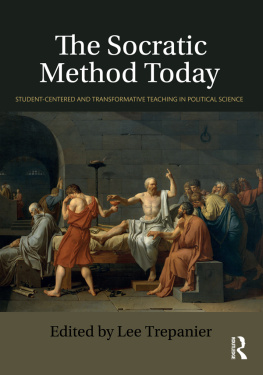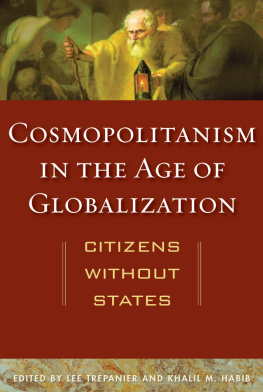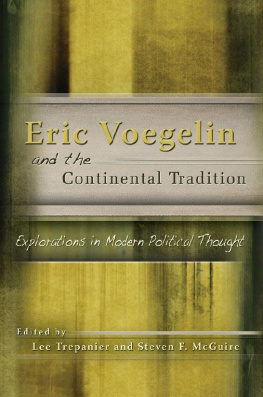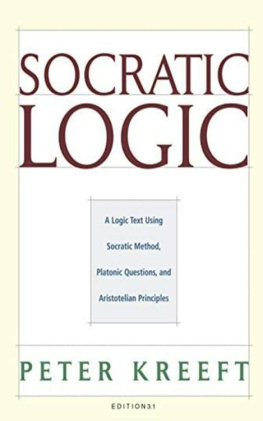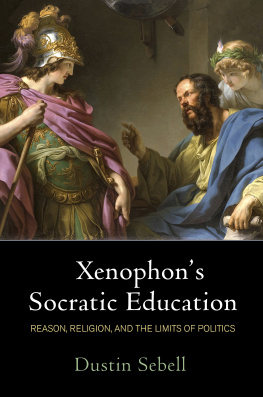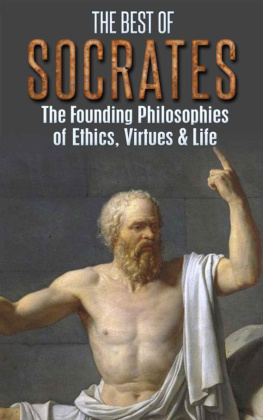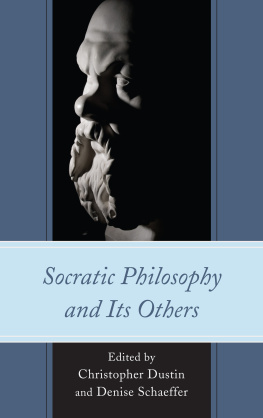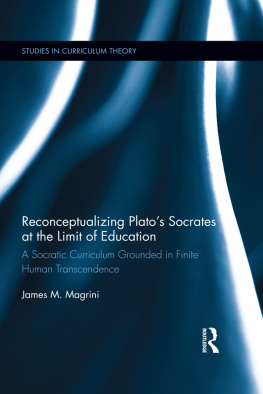The Socratic Method Today
This exciting new textbook provides a sophisticated examination of the Socratic method for teaching political science students in higher education. It shows how the Socratic method is employed in the Platonic dialogs, compares its transformative approach to other student-centered teaching philosophies, and addresses the challenges of adopting the Socratic method in the contemporary classroom.
The book is divided into three sections that integrate these practical aspects on the Socratic method with the theoretical considerations of Socratic philosophy while also addressing contemporary concerns about teaching and learning in higher education.
- Section One explores how the Socratic method is portrayed by Socrates in Platos dialogs.
- Section Two compares the Socratic method with modern and contemporary accounts of teaching and learning.
- Section Three examines some of the contemporary challenges of practicing the Socratic method in the university classroom today and how teachers can overcome them.
Written in a clear and engaging style, this timely intervention is essential reading for upper undergraduate students enrolled in courses that specialize in pedagogical techniques, political theory, Socratic philosophy, and law.
Lee Trepanier is Professor of Political Science at Saginaw Valley State University, USA; editor of Lexington Books Politics, Literature, and Film series; and author and editor of numerous books, the latest being Why the Humanities Matter Today: In Defense of Liberal Education (2017).
This is a unique and important volume on the timeless Socratic Method and its importance to education. Its publication is timely, as many institutions of higher education are struggling to engage students in an active form of pedagogy. The essays in this volume are brilliant, insightful, and are sure to illuminate the path back to the timeless method pioneered by Socrates, the greatest teacher of liberal education who ever lived.
Khalil Habib, Associate Professor of Philosophy, Salve Regina University, USA
First published 2018
by Routledge
711 Third Avenue, New York, NY 10017
and by Routledge
2 Park Square, Milton Park, Abingdon, Oxon, OX14 4RN
Routledge is an imprint of the Taylor & Francis Group, an informa business
2018 Taylor & Francis
The right of Lee Trepanier to be identified as the author of the editorial material, and of the authors for their individual chapters, has been asserted in accordance with sections 77 and 78 of the Copyright, Designs and Patents Act 1988.
All rights reserved. No part of this book may be reprinted or reproduced or utilized in any form or by any electronic, mechanical, or other means, now known or hereafter invented, including photocopying and recording, or in any information storage or retrieval system, without permission in writing from the publishers.
Trademark notice: Product or corporate names may be trademarks or registered trademarks, and are used only for identification and explanation without intent to infringe.
Library of Congress Cataloging-in-Publication Data
A catalog record for this title has been requested
ISBN: 978-0-8153-7188-5 (hbk)
ISBN: 978-0-8153-7190-8 (pbk)
ISBN: 978-1-351-24582-1 (ebk)
Typeset in Times New Roman by Sunrise Setting Ltd., Brixham, UK
Jordon B. Barkalow is an Associate Professor of Political Science at Bridgewater State University.
Andrew Bibby is the Director of the Center for Constitutional Studies at Utah Valley University and author of Montesquieus Political Economy (Palgrave Macmillan,2015).
Barry Cooper is a Professor of Political Science at the University of Calgary. He is the author, editor, and translator of over thirty books, with the latest being Consciousness and Politics: From Analysis to Meditation in the late Work of Eric Voegelin (St. Augustine Press,2016).
Paul Corey is the Program Coordinator and Professor of Liberal Studies at Humber Institute of Technology and Advanced Learning, and author of Messiahs and Machiavellians: Depicting Evil in Modern Theatre (University of Notre Dame Press,2008).
Ramona June Grey is a Professor of Political Science at the University of Montana.
Vanessa Jansche is an Assistant Lecturer of Philosophy at St. Gallen University.
Rebecca LeMoine is an Assistant Professor of Political Science at Florida Atlantic University and is author of the forthcoming book, Platos Caves: The Liberating Sting of Cultural Diversity .
David W. Livingstone is University College Professor of Liberal Studies and Political Science at Vancouver Island University and editor of Liberal Education, Civic Education, and the Canadian Regime: Past Principles and Present Challenges (McGill-Queens University Press,2015).
Steven F. McGuire is Thomas W. Smith Fellow at the Matthew J. Ryan Center at Villanova University and co-editor of Subjectivity: Ancient and Modern (Lexington Books,2016) and Eric Voegelin and the Continental Tradition (University of Missouri,2008).
Marlene K. Sokolon is Chair and Associate Professor of Political Science at Concordia University and author of Political Emotions: Aristotle on the Symphony of Reason and Emotion (Northern Illinois Press,2006) and co-editor of Fertile Ground: Production in Canada (McGill-Queens University Press,2014).
Sean Steel is Lecturer at Ambrose University College and author of The Pursuit of Wisdom and Happiness in Education: Historical Sources and Contemplative Practices (SUNY Press,2014).
Lee Trepanier is a Professor of Political Science at Saginaw Valley State University; editor of Lexington Books Politics, Literature, and Film series; and author and editor of numerous books, the latest being Why the Humanities Matter Today: In Defense of Liberal Education (Lexington Books,2017).
Ann Ward is an Associate Professor of Political Science at Campion College, University of Regina; author of Contemplating Friendship: Aristotles Ethics (SUNY Press,2016), Herodotus and the Philosophy of Empire (Baylor University Press,2008); and editor of several books, the latest being Socrates and Dionysus: Philosophy and Art in Dialogue (Cambridge Scholar Publishing,2013).
Lee Trepanier
There has been a renewed interest in pedagogy, teaching, and student learning in political science, with a focus on topics like flipping the classroom and active learning. Surprisingly absent in this discussion is the Socratic method, one of the oldest ways whereby teachers educate students. This book remedies this situation. It examines how the Socratic method is employed in the Platonic dialogs, how it is similar and different from contemporary pedagogical accounts, and how it can be adopted in todays classroom. Although aimed primarily for those in political science, this collection has broad appeal to anyone interested in the Socratic method.
When looking at previous works on the Socratic method, we encounter two types of books: 1) how-to manuals that are written for secondary school teachers; and 2) highly technical works of political philosophy where the Socratic method is secondary to the broader concerns of the authors. Examples of the first type are Nelsons Socratic Method and Critical Philosophy ; Gower and Stokes Socratic Questions ; Seeskins Dialogue and Discovery ; Nehamas The Art of Living ; Vallas Socratic Citizenship ; Eiseles Bitter Knowledge ; Jenks How Platos Theory of Truth Explains the Socratic Method ; Schlossers What Would Socrates Do? ; and Sebells The Socratic Turn .

